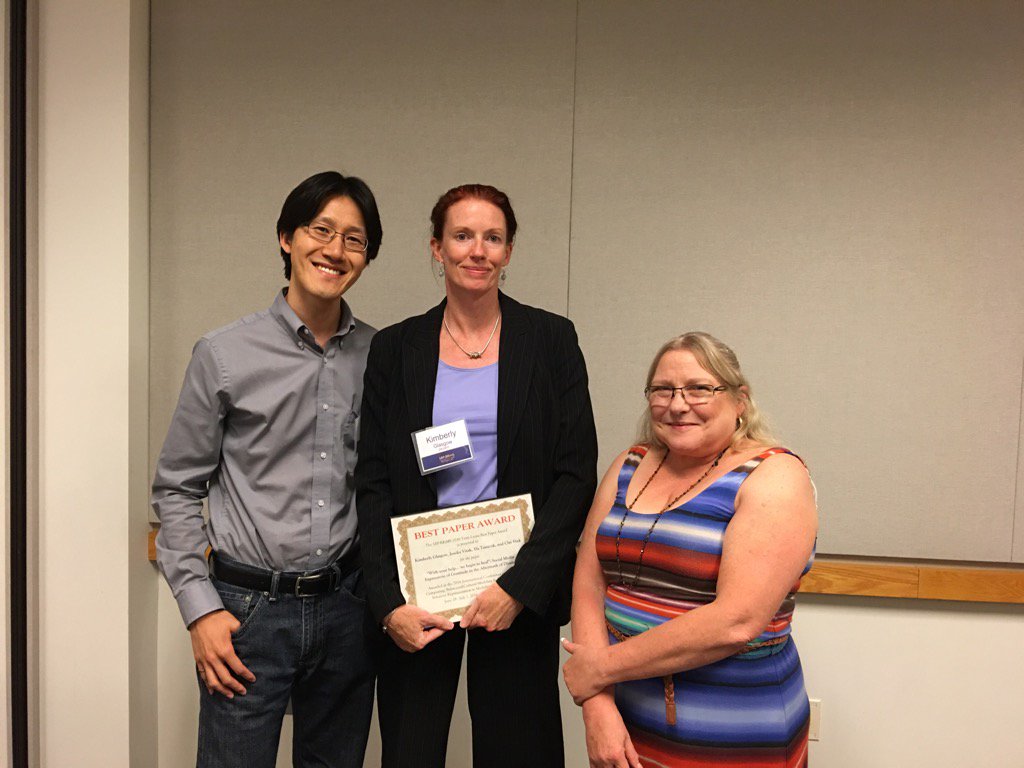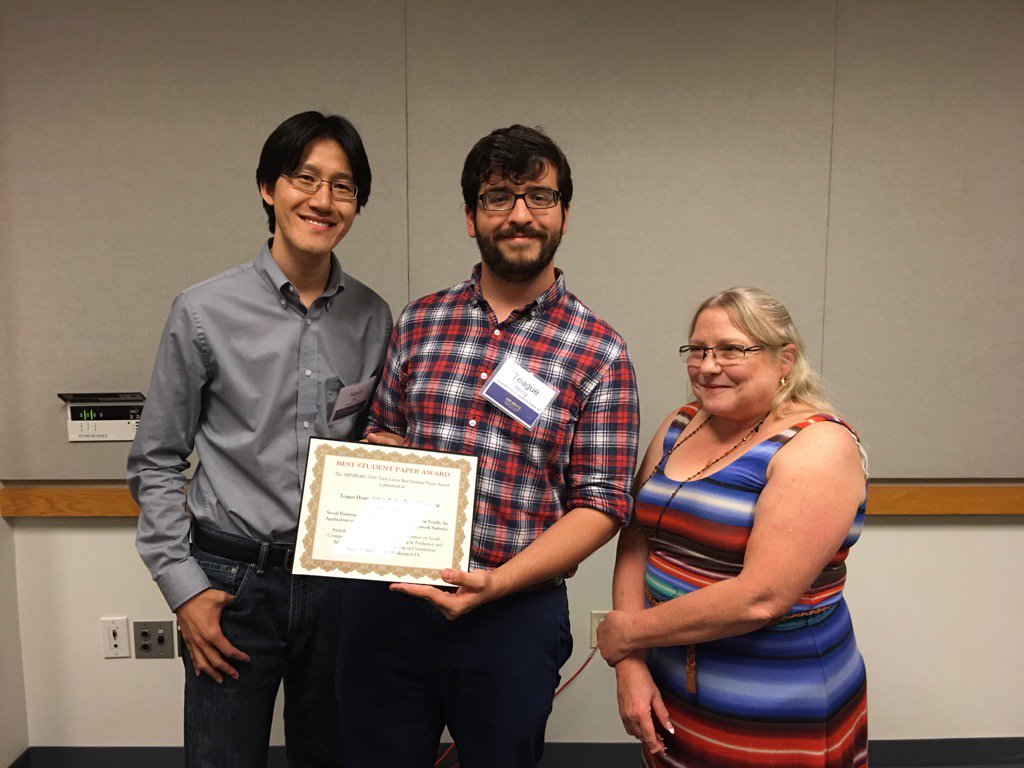2018 International Conference on Social Computing, Behavioral-Cultural Modeling, & Prediction and Behavior Representation in Modeling and Simulation
July 10-13, 2018, Lehman Auditorium, George Washington University, Washington DC, USA
All papers are qualified for the Best Paper Award. Papers with student first authors will be considered for the Best Student Paper Award. Those receiving these awards will be invited to publish an extended version in a special issue of the journal Computational and Mathematical Organization Theory.
IMPORTANT DATES:
Regular Paper Submission (for printed proceedings): 11-January-2018
Author Notification: 12-February-2018
Final Version Regular Paper Submission (for printed proceedings): 6-April-2018
Short Paper Submission (for printed proceedings): 20-March-2018
Author Notification: 14-April-2018
Final Version Short Paper Submission (for printed proceedings): 17-April-2018
Short Paper Submission (for online proceedings): 14-May-2018 (Due Midnight ET)
Author Notification: 01-June-2018
Final Version Short Paper Submission (for online proceedings): 18-June-2018
Doctoral consortium submissions due: 14-May-2018
Tutorial Submissions: 14-May-2018
Demo Submissions: 14-May-2018
Challenge Response Submission: 14-May-2018
To submit the final version, the authors should update easychair with their final submission and any zips (containing source images) at the same location as their original submission. In addition, authors should download and sign the copyright form and upload it in easychair along with their submission.
- Note, All regular papers will be evaluated for: presentation in plenary, presentation in regular session, presentation as poster, or no presentation. All accepted regular papers will be published in the physical proceedings - the Springer LNCS volume. This volume is considered archival.If you submit a regular paper and it is not accepted for a long presentation - you can still revise it and submit it to be considered for a short presentation or a poster.
Short papers (for printed proceedings) are intended for late-breaking news, more focused results, more conceptual papers, or other types of papers that may require less space than the regular papers. These short papers, submitted by March 20, 2018, will be evaluated for presentation in regular session, presentation as poster, or no presentation. All accepted short papers submitted by March 20 will be published in the physical proceedings - the Springer LNCS volume. This volume is considered archival.
If you submit a short paper (for printed proceedings) and it is not accepted you can still revise it and submit it by May 4, 2018, to be considered for a poster.
Short papers (for online proceedings) are intended for late‐breaking news, more focused results, more conceptual papers, or other types of papers that may require less space than the regular papers. All short papers submitted by May 4 will be evaluated for presentation in regular session, presentation as poster, or no presentation. All these accepted short papers will be published only in the online non-archival proceedings.
CALL FOR PAPERS:
Submissions are solicited on research issues, theories, and applications. Topics of interests include the following:
Advances in Sociocultural & Behavioral Process Modeling
* Group formation, interaction, and/or evolution* Collective action and governance
* Cultural patterns & representation
* Social conventions, social contexts and processes
* Influence process and recognition
* Public opinion representation, identification and modeling
* Information diffusion
* Psycho-cultural situation awareness
* Intelligent agents and avatars/adversarial modeling
* Models of reasoning and decision making
* Performance prediction, assessment, & skill monitoring/tracking
* Intelligent tutoring systems
* Cognitive robotics and human-robot interaction
* Human behavior issues in model federations
Information, Systems, & Network Science
* Data mining on social media platforms* Diffusion and other dynamic processes over networks
* Inference of network topologies and changes over time
* Analysis of link formations and link types
* Detection of communities and other types of structures in networks
* Analysis of high-dimensional networks
* Analytics for social and human dynamics
Military & Intelligence Applications
* Group formation and evolution in the political context* Networks and political influence
* Group representation and profiling
* Reasoning about terrorist group behaviors and policies towards them
* Cyber and attribution
* Computational methods to transform traditional GEOINT and open source data into spatio-temporal information describing events and activities
Applications for Health and Well-being
* Social network analysis to understand health behavior* Modeling of public health and health care policy and decision making
* Modeling of behavioral aspects of infectious disease spread
* Modeling of behavioral aspects of prevention and treatment for chronic diseases (e.g., cancer, obesity, asthma)
* Intervention design and modeling for behavioral health
Example Other Applications of Interest to the Community
* Economic applications of behavioral and social prediction* Model federation, integration, verification, or validation
* Evolutionary computing and optimization
* Education, training, professional development and workforce training in modeling and simulation
FORMAT AND SUBMISSION:
The conference solicits three categories of papers:
Regular papers (max. 10 pages)
All topics and authors (academic, government, industry) welcome.Published in a Springer volume and online. Accepted papers will be in one of these venues: plenary, regular sessions, or poster presentation. Note: the 10 pages includes all tables, references and images.
Short papers (max. 6 pages) - due March 20, 2018
All topics and authors (academic, government, industry) welcome.Published in a Springer volume and online. Accepted papers will be in one of these venues: plenary, regular sessions, or poster presentation. Note: the 6 pages includes all tables, references and images.
Short Papers/Late Breaking Results (max. 6 pages)
All topics and authors (academic, government, industry) welcome.Published online. Accepted papers will be in one of these venues: regular sessions or poster presentation. Note: the 6 pages includes all tables, references and images.
Demos (2-page minimum, or 6-page maximum)
Published online. All accepted demos should bring a poster, their tool to demo, and will demo that tool during the poster/demo session.Note: the 2-6 pages includes all tables, references and images.
Paper Formatting Guideline
The papers must be in English and MUST be formatted according to the Springer-Verlag LNCS/LNAI guidelines. Sample LaTeX2e and WORD files are available at http://www.springer.com/computer/lncs?SGWID=0-164-6-793341-0. It is not required to submit a cover page first, this is optional.All regular full paper submissions should be submitted as a paper with a maximum of 10 pages using the foregoing format. Total page count includes all figures, tables, etc. but not references. All accepted and finalized papers will be published in the formal printed proceedings. This is an archival document.
All short paper submissions should be submitted as a paper with a maximum of 6 pages using the foregoing format. Total page count includes all figures, tables, etc. but not references. As described above, all accepted and finalized papers will be published in either the formal printed proceedings (which is an archival document) or the online proceedings (which is not archival).
All posters and their associated paper, all demo descriptions, and all challenge problems and their associated paper will be published only in the on-line proceedings.
All submissions for posters, demo-presentations, challenge problem entries and late breaking results should be submitted as a paper with a maximum of 6 pages using the same format as the regular papers. All accepted entries will be posted on the SBP-BRiMS 2018 website.
A selection of authors will be invited to contribute journal versions of their papers to one of two planned special issues of the Springer journal “Computational and Mathematical Organization Theory” and another high-profile journal.
Publication
For any questions and inquiries concerning submissions, please email the program chairs at sbpbrims@andrew.cmu.edu.
CHALLENGE:
The conference expects to announce a computational challenge as in previous years. Additional details will be posted on the conference website.
FUNDING PANEL & CROSS-FERTILIZATION ROUNDTABLES:
Previous SBP conferences have included a Cross-fertilization Roundtable session or a Funding Panel. The purpose of the cross-fertilization roundtables is to help participants become better acquainted with people outside of their discipline and with whom they might consider partnering on future SBP-related research collaborations. The Funding Panel provides an opportunity for conference participants to interact with program managers from various federal funding agencies. Participants for the previous funding panels have included representatives from federal agencies, such as the NSF, NIH, DoD, ONR, AFOSR, USDA, etc.
BEST PAPER AWARDS:
SBP-BRiMS18 will feature a Best Paper Award and a Best Student Paper Award. All papers are qualified for the Best Paper Award. Papers with student first authors will be considered for the Best Student Paper Award. For additional information go here.
HOTEL AND LOGISTICS:
Information on hotel and logistics are here.
DIVERSITY AND TRAVEL SCHOLARSHIPS:
It is anticipated that a limited number of diversity and travel scholarships will be available on a competitive basis to students who are presenting papers. Additional information is here.The submission website is available at: https://easychair.org/conferences/?conf=sbpbrims2018. To register a paper abstract, use the standard Easychair submission website and submit your title and abstract. Until the final paper deadline, you will be able to update your submission.

